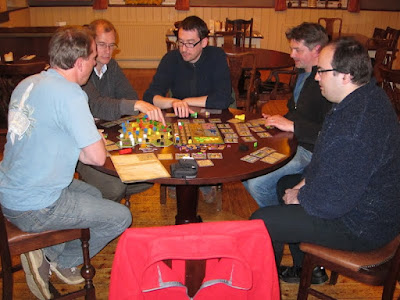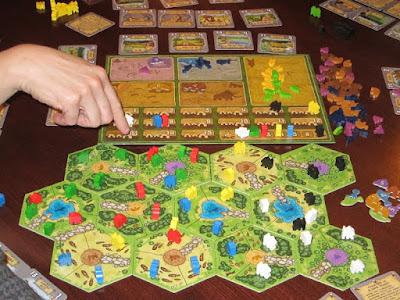It was great to welcome another new face, Stephane, to our merry throng and as it turns out a fellow blogger although with quiet a different focus (a link to his blog is here http://drwillettsworkshop.blogspot.co.uk/).
The evening kicked off with a game of TransEuropa whilst we waited for Robin and Oliver to join us. It was Martin and Stephane’s first encounter with this quick, light game and it got a definite thumbs up from them.
The second game Power Grid: The First Sparks was one of only two purchases at this year’s UK Games Expo and one that, despite of having played over 20 games in the intervening time, was yet to be played. With our number at 6 and with it being Stephane’s first encounter with us I was keen to keep everybody together in one game.
Of the games I had brought with me that could accommodate 6 players I only had three: TransEuropa (!), 7 Wonders and Power Grid: The First Sparks. Having played its older and more well known version Power Grid four weeks earlier and believing First Sparks to be a light version of this popular game I thought, what have we got to loose. Well maybe with a different less patient group maybe quiet a lot!
I had read through the rules whilst playing sardines on the commuter train home 10 days earlier but I should have been guided by previous experience i.e. this counts for little when it comes to your first game. There is no substitute for sitting down and playing a game to really understand it and get to the point that you can comfortably explain it and teach others. A game that can seem complex through the learning process can often become relatively simple once the rules are fully understood and I feel this is the case with this game.
Learning a new game always requires a degree of patience and the degree of patience is generally correlated to the minimum age on the game box. So games with start ages of 8 or 10 are generally pretty quick and quiet simple to explain. This game however has an age of 13 (meaning that the term ’light’ was more relative than real), a degree of difference that is quiet significant. Put this together with a set of rules written on a brown coloured paper, written in 6 point font, over 8 foolscap pages and in a dimly lit pub then this was never going to be an easy journey.
The team was very patient as I read through the rules answering questions as I could, but it will surprise nobody who has played this type of game before to know that it probably took 40 minutes – not ideal.
Once we started playing the game progressed relatively quickly and most agreed that they could see that a four player game could be played inside an hour, with most keen and willing to give the game another go.
The game is played on a number of hexagon tiles made up to create a landscape of areas (valleys) that generate 4 different types of food, mammoths, bears, berries and fish. In addition to these players can farm and so generate arable crops. Players start with 1 or 2 clan members and seek to build their tribe to the winning number of 13 through the acquisition of technology cards, made of tools and knowledge e.g. Fire, that allow them to become more efficient hunters and gatherers – so able to feed a larger clan.
Not surprisingly given the similarities, in game play if not setting and theme, between this game and the original and Martin’s experience he eventually emerged triumphant.
Mea culpa - in trying to read the rules as we learnt the game I managed to make a number of errors of understanding / interpretation with regards to the rules for which I can only apologise.
The following section can be ignored for those not present.
1. The Technology cards come in two types:
Tools e.g. fields (yes the terminology at times needs to be ignored), Baskets, Spears etc.
Knowledge e.g. Fire, Speech, Plough etc.
The limitation on 3 cards relates to Technology not Knowledge whereas we played the limitation as applying to all our cards – oops no.1.
2. At the beginning of the game players can choose to pay, the normal costs, to place a second clan member. We all started with only one clan member – oops 2.
3. You place a crop (value 1) on the lowest value card in the technology market (as said you have to ignore some of the language otherwise you will get lost in the anomalies given the theme) at the beginning of the first phase.
Things were very dark in the pub (only Oliver had discovered fire after all) but I am fairly sure we repeatedly omitted to place the additional bonus crop.
4. In Phase 4 (Bureaucracy – have I said enough about terminology and theme yet!!), if the lowest value card in the Technology Market is the one with the bonus crop on it then it is removed from the game.
We completely omitted this element and so played with more technology cards than the game intends.
Having multiple clan members around the same ‘hunting ground’, a term used for lakes and berry bushes as well as areas were mammoths and bears can be killed, has no value in the hunting phase.
5. We mistakenly gave ourselves the benefit of an extra resource for each clan member adjacent to hunting grounds of the same type including the same hunting ground. We did notice that we seemed to be hunting the bears to near extinction!
6. Having clan members adjacent to more than one hunting area, of the same type, has the benefit of adding a virtual beast, fish or berry to the supply of these resources and so may yield an extra one for you.
The consequences of our mistaken understanding I have already recounted!
7. When the shuffle card is revealed the nature of the technology market changes. Firstly two cards are removed (the highest and lowest) and secondly the bottom row of now three cards is no longer an indication of what will be available in the future but is available to buy as part of the ‘current market’.
Why have I recounted in such gory detail our (my) failings? It seems to me that with a different group of people this could have been a disaster, yet their patience meant that whilst at times we were frustrated by the introduction / revelation of some new understanding of the rules the group still had an enjoyable evening.
I wrote an article a while ago entitled “Why Games Work in Some Families and Not Others?” and as I write this blog I was reminded of the section on competitiveness and rules. On Sunday night we were lucky enough to have a group of people who all had a similar attitude and willingness to work through the learning process of a slightly more complex game.
Could I have done things differently given the games available yes, maybe it would have been better to go for 7 Wonders however having played it quiet a bit this year and having enjoyed the supposedly more complex Power Grid the group was happy to give this new game a try.
Certainly learning the game in the way we did is never ideal, however unless you have a greater amount of time then I do it is virtually impossible to avoid what I am sure some may have felt to be a tortuous approach.
Personally though I cannot wait to give the game another go and hopefully on the next occasion beat Martin!
More photo's of the evening can be seen here.
Our next event at the Blue Anchor, Crowborough is in two weeks time on Sunday 24th June starting at 7.00pm - £1 per head. More details can be seen on our Facebook Page Social Gamers - Crowborough













Would be great to try again and correct your mis-guided belief that you can beat me!
ReplyDeletep.s. on the subject of teaching new games, this is an interesting article from Ryan Sturm http://howtoplaypodcast.com/about/the-htp-method-for-teaching-games/
That sounds like a challenge! :-)
ReplyDeleteI have had a quick look at your link and it looks an excellent article, although I have not yet had time to read it in full.
The key thing is time and planning and sometimes circumstances don't allow for this.